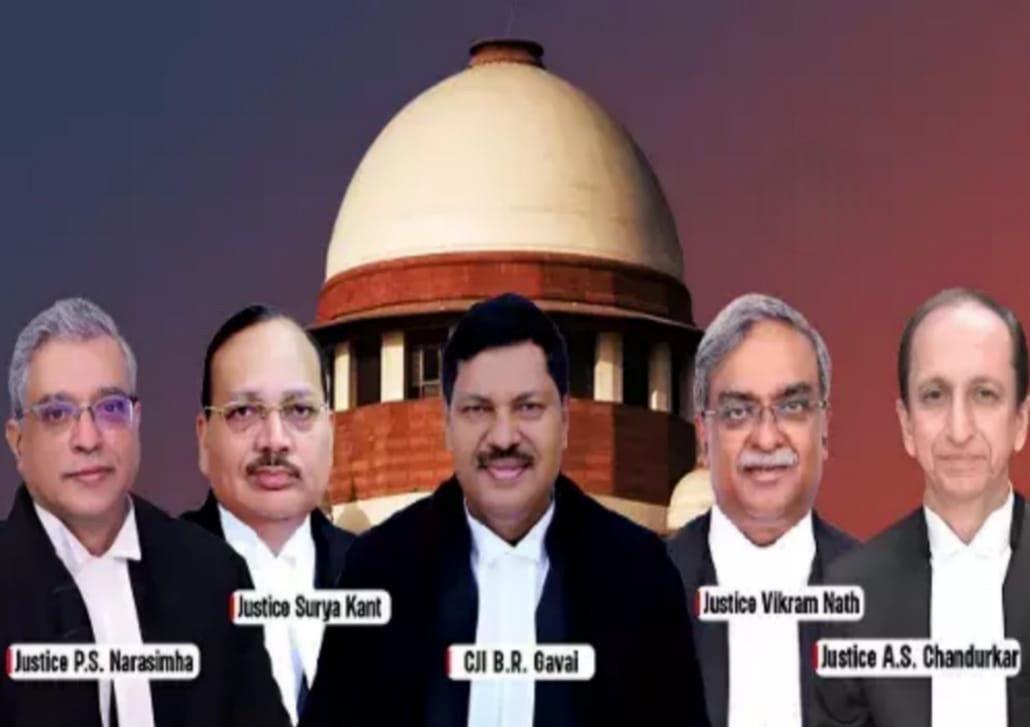
By Sulagna Halder
New Delhi:
The Supreme Court of India on Tuesday announced that it will begin hearings from August 19 on the Presidential reference regarding the powers and timelines for the President and State Governors when assenting to Bills passed by State legislatures. The Constitution Bench will first examine the maintainability of the reference before considering its merits.
The matter stems from a reference made by President Droupadi Murmu under Article 143(1) of the Constitution, which permits the President to seek the Supreme Court’s opinion on matters of public importance or legal interpretation. The reference raises concerns over the Court’s April 8 ruling which imposed timelines on the President and Governors for acting on Bills and held their inaction subject to judicial review.
A five-judge Constitution Bench comprising Chief Justice of India BR Gavai, and Justices Surya Kant, Vikram Nath, PS Narasimha, and Atul S Chandurkar will hear the case. On Tuesday, the Bench directed all parties to submit their written submissions by August 12.
“Let parties file written submissions on or before August 12. For nodal counsels for Union and all other parties, we appoint Ms Misha Rohatgi for those opposing the reference. We will start hearing on August 19,” the CJI said.
The Bench clarified that it would first hear arguments on the maintainability of the reference on August 19, 20, 21, and 26, with supporting parties to be heard on August 20, September 2, 3, and 9.
Appearing for the State of Kerala, Senior Advocate KK Venugopal challenged the maintainability of the reference. “There are grounds for it to be returned, and we question the maintainability,” he stated.
Senior Advocate Kapil Sibal, also opposing the reference, added, “Ms Misha Rohatgi will be nodal counsel from our side.”
Solicitor General Tushar Mehta, representing the Centre, informed the Court that “Mr Aman Mehta will be the standing counsel at our end.”
The Presidential reference raises fourteen questions about the interpretation of Articles 200 and 201, especially the Court’s authority to prescribe deadlines for constitutional authorities. It contests the idea of “deemed assent” in the absence of timely action by Governors or the President, a principle introduced by the April ruling in a case filed by Tamil Nadu against its Governor.
In that ruling, Justices JB Pardiwala and R Mahadevan held that although Article 200 does not specify a time frame, the Governor cannot delay assent indefinitely. “Though no timeline is prescribed under Article 200, the same cannot be construed as conferring untrammelled discretion,” the bench observed.
The Court also stated that under Article 201, the President must take a decision on reserved Bills within three months and communicate reasons for any delay beyond that.
The reference questions whether the Supreme Court can fill constitutional silences with binding timelines and whether such directions impinge upon the discretion of constitutional functionaries. It also asserts that judicial directions should not override legislative or executive functions.
Both Kerala and Tamil Nadu have argued that the reference amounts to a disguised appeal against the Court’s own ruling and is therefore not maintainable. The Tamil Nadu government has urged the Court to return the reference unanswered, maintaining that the judiciary cannot sit in review of its own judgments under the guise of a reference.
The outcome of this matter could redefine the balance of power between the three branches of government, especially the interplay between constitutional silence and judicial activism.